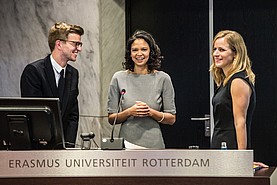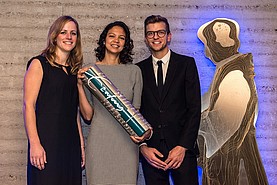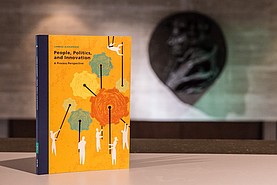PhD Defence: People, Politics, and Innovation - A Process Perspective

In her dissertation, ‘People, Politics, and Innovation: A Process Perspective’, Lameez Alexander confronts innovation in organizational settings and the broad consensus of innovation as the ‘Holy Grail’ of competitive advantage and growth. Lameez Alexander creates an innovation management model which (1) centre’s around ‘people’ as the key determinant of innovation, and (2) accounts for ‘innovation ownership struggles’ between two key actors, ‘innovators’ and ‘managers’. Analysis of ‘innovation ownership struggles’ allows for re-alignment of innovation processes at key points to create a more shared, participative control structure.
Lameez Alexander defended her dissertation in the Senate Hall at Erasmus University Rotterdam on Thursday, 18 December 2014. Her supervisors were Professor Harry Barkema and Professor Daan van Knippenberg. Other members of the Doctoral Committee included Professor Pursey Heugens (ERIM), Professor Niels Noorderhaven (Tilburg Universiteit) and Dr. Daan Stam (ERIM).
About Lameez Alexander

Lameez received a Master’s degree in Research Psychology and a Bachelor degree in Psychological Studies from the University of Cape Town, South Africa. She was a visiting scholar at the University of Newcastle, Australia since 2007 and started her PhD at the Rotterdam School of Management in 2008. Her research interests lie at the intersection of psychology and sociology. Lameez has presented her work at several international conferences including the Academy of Management and Organization Studies summer conference. Currently Lameez is a Postdoctoral Fellow at the Rotterdam School of Management.
Thesis Abstract

Innovation is often considered the Holy Grail of competitive advantage and growth in modern organizations. Organizing for innovation can therefore be seen as the cornerstone of organizational success. In this dissertation, I aimed to advance a more complex and dynamic understanding of innovation that places people – what they do and how they do it – at the centre of the process. The two studies in this dissertation both advance novel theoretical concepts and models of the innovation process.
In the first study I propose a novel approach for managing motivational states of innovation teams that involves dynamically adapting group goal preferences at key points in the innovation process in order to achieve team innovation implementation success.
In the second study I conducted ethnographic field research to analyse political disputes about control between innovators and managers during the innovation process. I develop and propose a novel theoretical concept referred to as “innovation ownership struggles”, which I define as, ‘disputes for control between innovators with a strong sense of psychological ownership towards the innovation and managers with formal control over the innovation’. I show how innovation ownership struggles serve to expose imbalances in control between innovators and managers so that they can begin to consider more shared and participative control structures that are critical for successful innovation.
Photos: Chris Gorzeman / Capital Images


